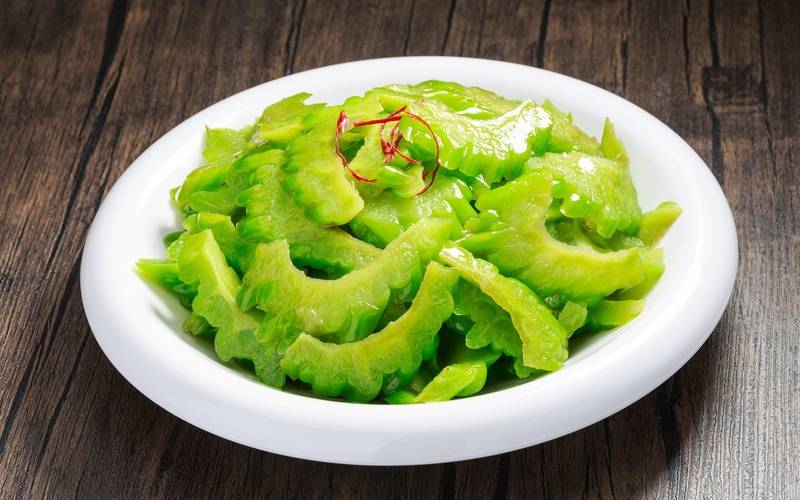August is in the midsummer heat, and multiple food-related topics have sparked discussion on the internet, such as “bitter melon can lower blood sugar,” “don’t eat melons with lots of bacteria overnight,” and “the tip tastes sweet, the root tastes bitter.” Let’s take a look at what food rumors are circulating in August.
Fried bitter melon. Photo/ICphoto
1. Can bitter melon lower blood sugar? No consensus
Rumor: It is a folk belief that eating bitter foods in summer, especially bitter melon and bitter vegetables, can lower blood sugar.
Fact: A science popularization article by the China Association for Science and Technology and the National Health Commission’s WeChat account, Science China, pointed out that it is not confirmed that bitter melon can lower blood sugar. Bitter melon’s active ingredient, bitter melon extract, has shown effectiveness in lowering blood sugar in animal experiments, but without human trials, its effects on humans are unknown. Another component is Polypeptide P, which is structurally similar to insulin but its blood-sugar-lowering effects are unclear, and its content is limited. Relying solely on consuming a large amount of bitter melon to control blood sugar is unrealistic. Additionally, blood sugar control is influenced by various factors such as overall diet structure, exercise, medication, and shouldn’t rely solely on eating bitter melon but should adopt a comprehensive and scientifically reasonable sugar control approach.
2. Does Enoki mushroom grow in reverse in the fridge due to added hormones? No relation
Rumor: There’s a rumor circulating online that Enoki mushrooms placed in the fridge will grow larger after a few days, attributed to unscrupulous merchants using excessive hormones.
Fact: The August “Scientific” Rumor List jointly refuted this claim, stating that Enoki mushrooms grow best at lower temperatures, approximately 6℃-10℃. The fridge provides suitable temperature, humidity, and light-blocking environment necessary for their growth, and the remaining substrate at the base provides nutrients. This combination creates favorable conditions for Enoki mushrooms to grow in reverse inside the fridge, unrelated to hormones.
3. Are bacteria abundant in overnight watermelon making it inedible? Proper storage makes it safe to eat
Rumor: August is a time for eating watermelon, and there’s a rumor circulating online that overnight watermelon has a lot of bacteria and shouldn’t be eaten.
Fact: According to a Science China article, an analysis was done on the total bacterial count of fresh-cut watermelon, overnight refrigerated cut watermelon, and the surface area 2 cm below the cut of overnight refrigerated watermelon (the overnight time being 16 hours). The results showed no significant difference between the three in terms of total bacterial count. This indicates that low-temperature refrigeration significantly delays or inhibits bacterial growth on watermelon cuts, making overnight watermelon safe to eat. If stored properly, fresh watermelon can still be consumed even after overnight storage; if unable to finish, cover the cut with plastic wrap, store in the fridge, and avoid mixing with raw meat or eggs.
4. Is “The tip tastes sweet, the root tastes bitter” true? It doesn’t exist
Rumor: Folklore suggests that there is a “taste map” on the tongue, specifically “sweet at the tip, bitter at the root, sour and salty on the sides.”
Fact: The August “Scientific” Rumor List refuted this claim, stating that the “taste map” on the tongue doesn’t exist. In reality, each taste bud is a microscopic taste perception unit containing around 100 closely packed taste receptor cells that can sense sweet, sour, bitter, salty, and umami flavors. Scientists have found that taste perception is through taste receptor cells distributed on taste buds, where salty and sour tastes are sensed through ion channel receptors, while bitter, sweet, and umami tastes are perceived through G protein-coupled receptors. There is no significant positional difference in the distribution of these taste receptor cells on the tongue’s taste buds.
5. Can eating soapberries enhance beauty and keep you youthful? Incorrect
Rumor: There’s a belief that soapberries, when boiled, turn sticky due to their high collagen content, which can enhance beauty and keep you youthful.
Fact: Ruan Guangfeng, Deputy Director of the Food and Health Information Exchange Center of Kexin, pointed out that this statement is incorrect. Soapberries become sticky when boiled due to their rich non-starch polysaccharides, a water-soluble dietary fiber that, while having no beauty benefits, offers some advantages for gut health, helping alleviate and prevent constipation to some extent. Currently, there is no food known to enhance beauty and youthfulness. Many people stay up late and consume expensive health products, but it’s better to adjust to a healthy diet and lifestyle for the best outcomes.
New Beijing News Reporter: Liu Huan
Editor: Qin Shengnan
Proofreader: Mu Xiangtong


